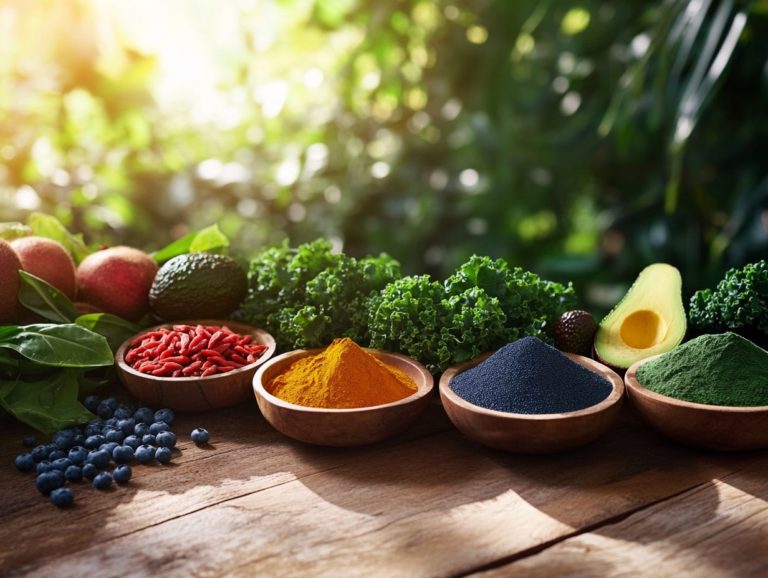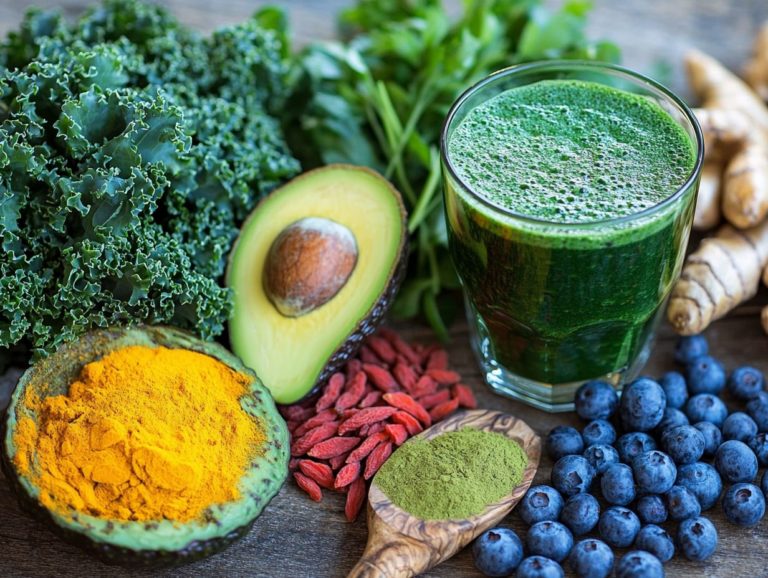What Makes a Food a Superfood?
Superfoods have changed the nutrition landscape. What makes a food a superfood?
These nutrient-dense powerhouses offer impressive health benefits. In this article, you ll uncover the key nutritional components that elevate superfoods above the rest, explore popular examples and their advantages, and gain practical tips for incorporating them into your meals.
You will explore the differences between superfoods and supplements, empowering you to make informed dietary choices. Discover how superfoods can boost your health today!
Contents
Key Takeaways:
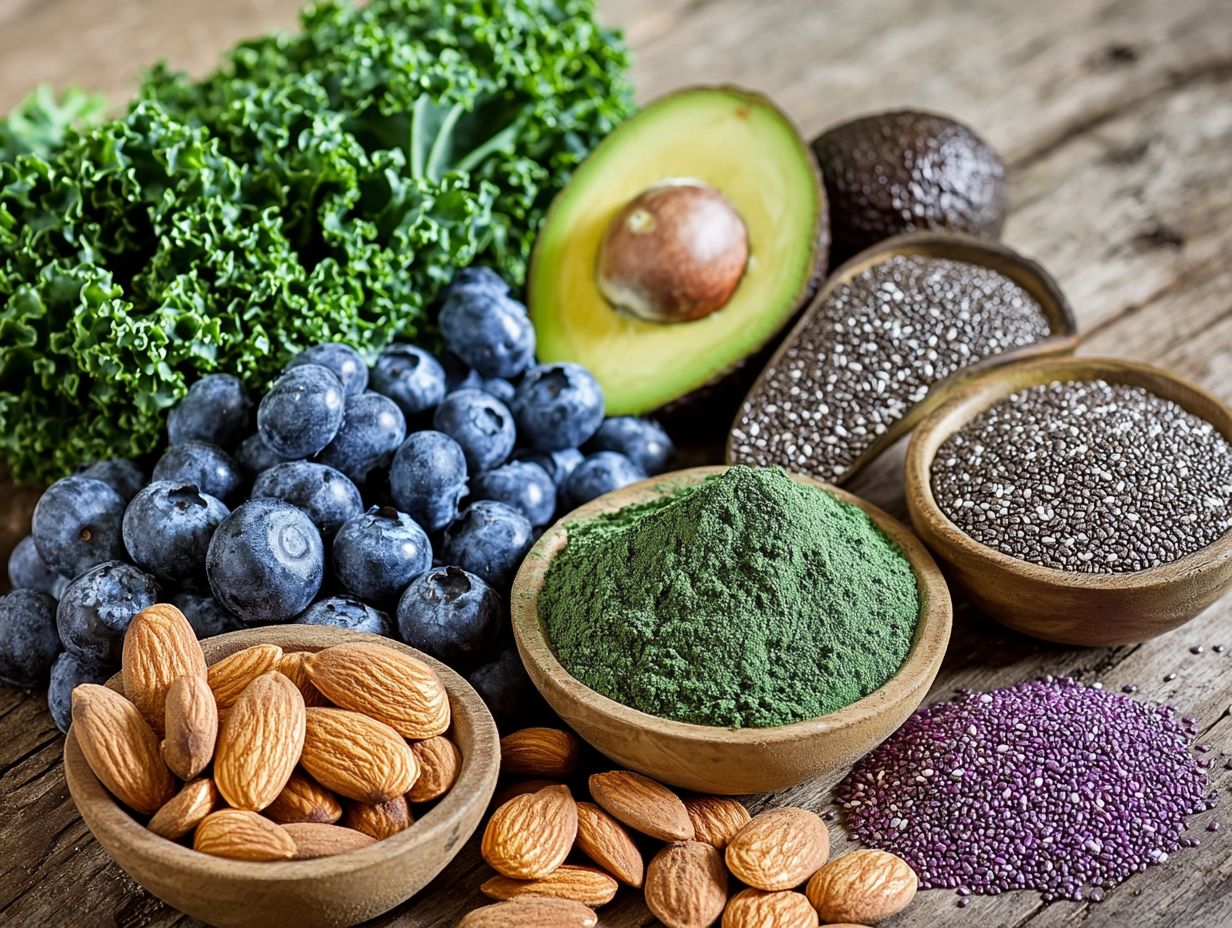
- Superfoods are nutrient-dense foods that offer a range of health benefits, including high levels of vitamins, minerals, antioxidants, and other beneficial compounds.
- Incorporating superfoods into your diet can boost your overall health and provide specific benefits such as improved immune function, increased energy, and reduced inflammation.
- While supplements may offer convenience, it’s crucial to prioritize whole, natural superfoods in your diet as they provide a more diverse range of nutrients and potential health benefits.
Defining Superfoods
Superfoods are the best of nutrient-dense foods, offering remarkable health benefits that elevate your diet. These exceptional foods are packed with vitamins, minerals, and powerful antioxidant compounds, making them irresistible for those who prioritize their dietary needs.
As the food industry continues to evolve, understanding what qualifies as a superfood helps you make choices that align with your health goals.
What Qualifies as a Superfood?
A superfood is characterized by its impressive nutrient profile, packed with vitamins, minerals, and antioxidant compounds that offer significant health benefits.
This classification includes foods that provide a high concentration of essential nutrients relative to their calorie content, making them outstanding choices for anyone looking to enhance their diet. Many superfoods come with health claims think improving heart health, boosting energy levels, or aiding digestion which cater to various dietary preferences.
Take kale, for example. It’s celebrated for its abundant vitamin K, essential for bone health. Quinoa shines as a complete protein, meaning it contains all essential amino acids, making it particularly appealing to vegetarians. Similarly, blueberries are famous for their antioxidant properties and support cognitive health, earning them a special place in the wellness community.
Nutritional Benefits of Superfoods
Superfoods are packed with amazing flavors and incredible health benefits. These nutritional powerhouses can enhance immune function and play a pivotal role in disease prevention.
Specific Vitamins and Minerals
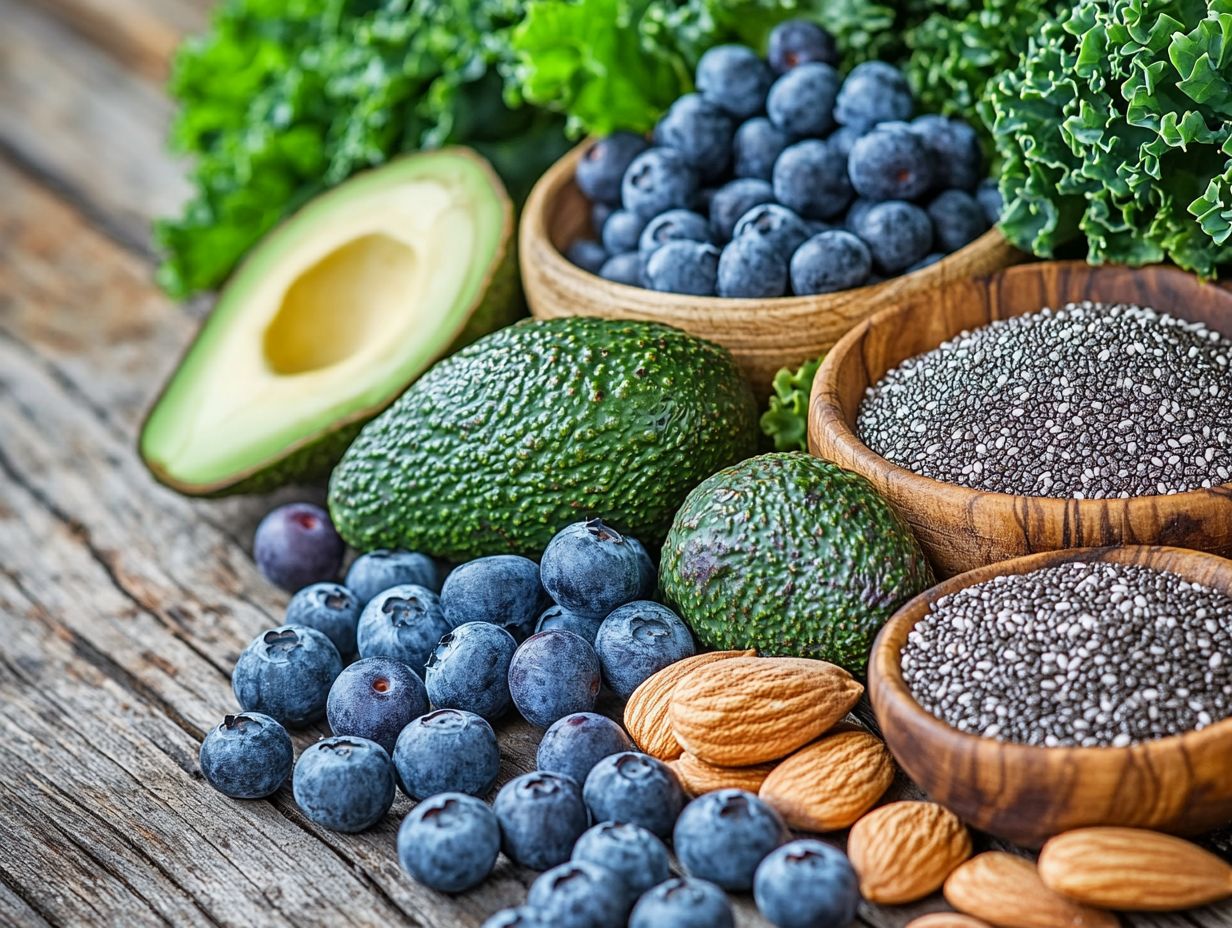
Certain superfoods stand out for their impressive concentrations of vitamins and minerals essential for maintaining optimal health.
Take leafy greens like kale, which is a stellar source of vitamin K, critical for blood clotting. Fatty fish like salmon are rich in omega-3 fatty acids, known for their heart-protective qualities and ability to reduce inflammation.
By incorporating these nutrient-dense foods into your daily meals, you elevate your overall well-being and support various bodily functions. Diversifying your diet with superfoods rich in essential nutrients enables you to cultivate a balanced and healthful eating pattern that champions longevity and vitality.
Don’t wait! Start including superfoods in your meals today to boost your health!
Antioxidants and Other Compounds
Antioxidants in superfoods play a crucial role in fighting chronic inflammation and boosting your immune function.
These remarkable compounds, including flavonoids, carotenoids, and polyphenols, are abundant in various fruits, vegetables, and nuts. They neutralize free radicals, helping to reduce oxidative stress, which is linked to several health conditions.
Adding antioxidant-rich foods to your diet can greatly improve your cardiovascular health, enhance cognitive function, and lower your risk of chronic diseases such as diabetes and cancer.
The combination of vitamins C and E, along with selenium, shows how these nutrients work together to strengthen your body s defenses, promoting overall well-being and longevity.
Examples of Superfoods
The superfoods category is vast, offering an impressive array of healthy choices. Here, you’ll find celebrated superfruits and super grains known for their remarkable health benefits.
Popular Superfoods and Their Benefits
Some of the most celebrated superfoods include quinoa, blueberries, and green tea, each offering distinct health benefits that make them excellent choices for a health-conscious diet.
Quinoa is often seen as a complete protein, providing all nine essential amino acids and rich in fiber. It s perfect as a base for your salads and bowls.
Blueberries are loaded with antioxidants, supporting heart health and enhancing cognitive function. They effortlessly boost the nutritional profile of smoothies or yogurt parfaits.
Green tea, known for its metabolism-boosting qualities, can be enjoyed hot or iced and even added to savory dishes for extra flavor.
Incorporating these superfoods into your meals can transform your cooking, ensuring every bite is both nourishing and satisfying.
Incorporating Superfoods into Your Diet
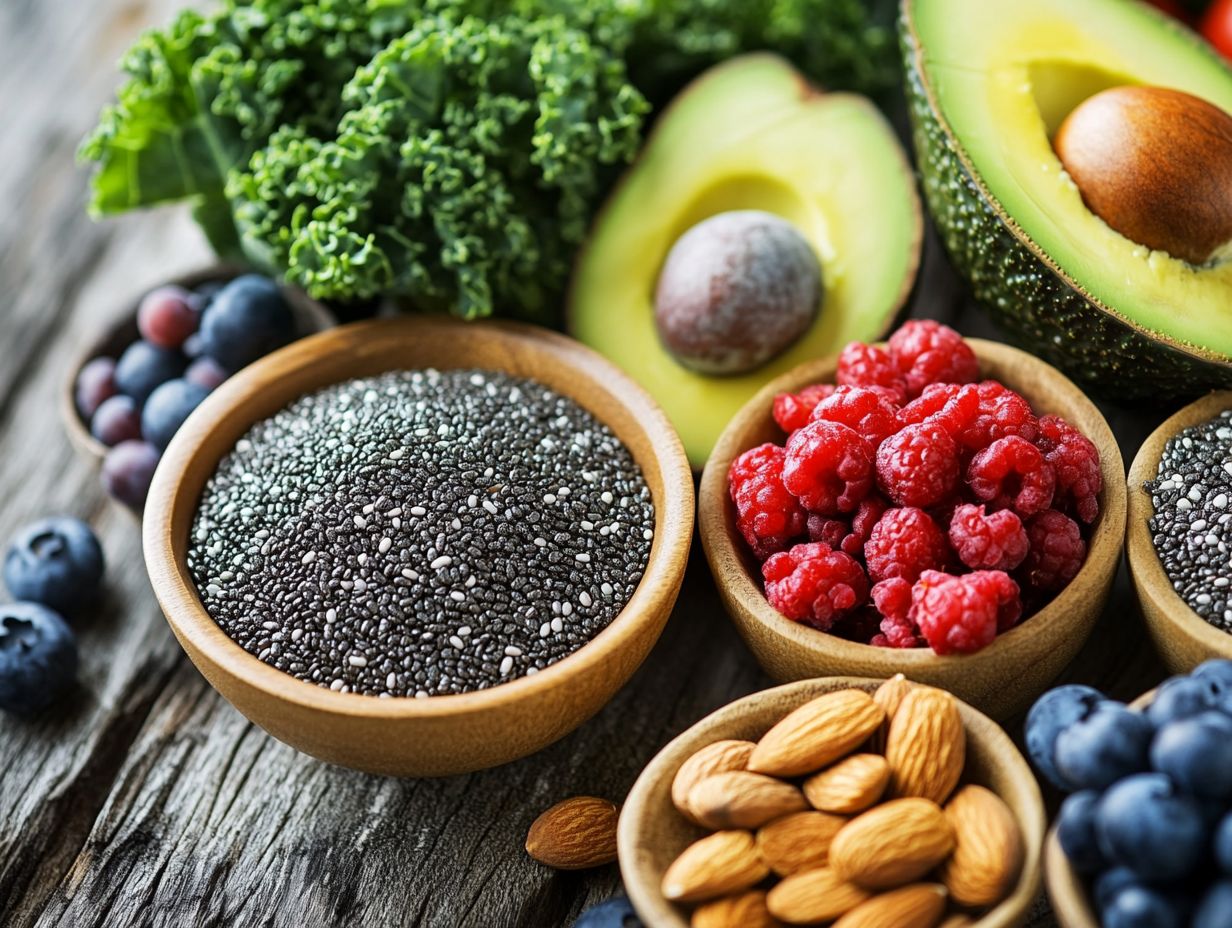
Add superfoods to your diet for an exciting way to boost nutrition and flavor in your meals.
Tips for Adding Superfoods to Meals
To enhance your meals with superfoods, consider creative ways to include them in your cooking and meal planning.
For example, adding chia seeds to smoothies or oatmeal can provide a powerful nutrient boost. Incorporating spinach into soups or sauces enhances flavor and delivers essential vitamins.
If you want to elevate your salads, sprinkle hemp seeds or pomegranate arils to amplify taste and introduce beneficial antioxidants.
Exploring herbs like turmeric and ginger in your dishes adds unique flavor while highlighting their anti-inflammatory properties.
By diversifying your meals with these healthy ingredients, you can maintain a balanced diet that supports overall well-being.
Superfoods vs. Supplements
The choice between superfoods and supplements focuses on their nutritional benefits, ease of incorporation into your diet, and potential health risks. Each option comes with unique advantages and considerations that require careful evaluation.
Benefits and Drawbacks of Each Option
Both superfoods and supplements have their own advantages and disadvantages, tailored to your unique dietary preferences and health goals.
When it comes to boosting overall health and preventing diseases, superfoods shine as a more appealing choice. Full of essential nutrients, antioxidants, and phytochemicals (natural compounds found in plants), these natural wonders can elevate your immune system and provide holistic benefits that synthetic supplements often can’t match.
Processed foods can strip away many crucial nutrients, putting you at risk for deficiencies and various health challenges. Focusing on natural foods allows you to benefit from the combined effects of vitamins and minerals that often work together in harmony, unlike the isolated compounds found in supplements.
Frequently Asked Questions
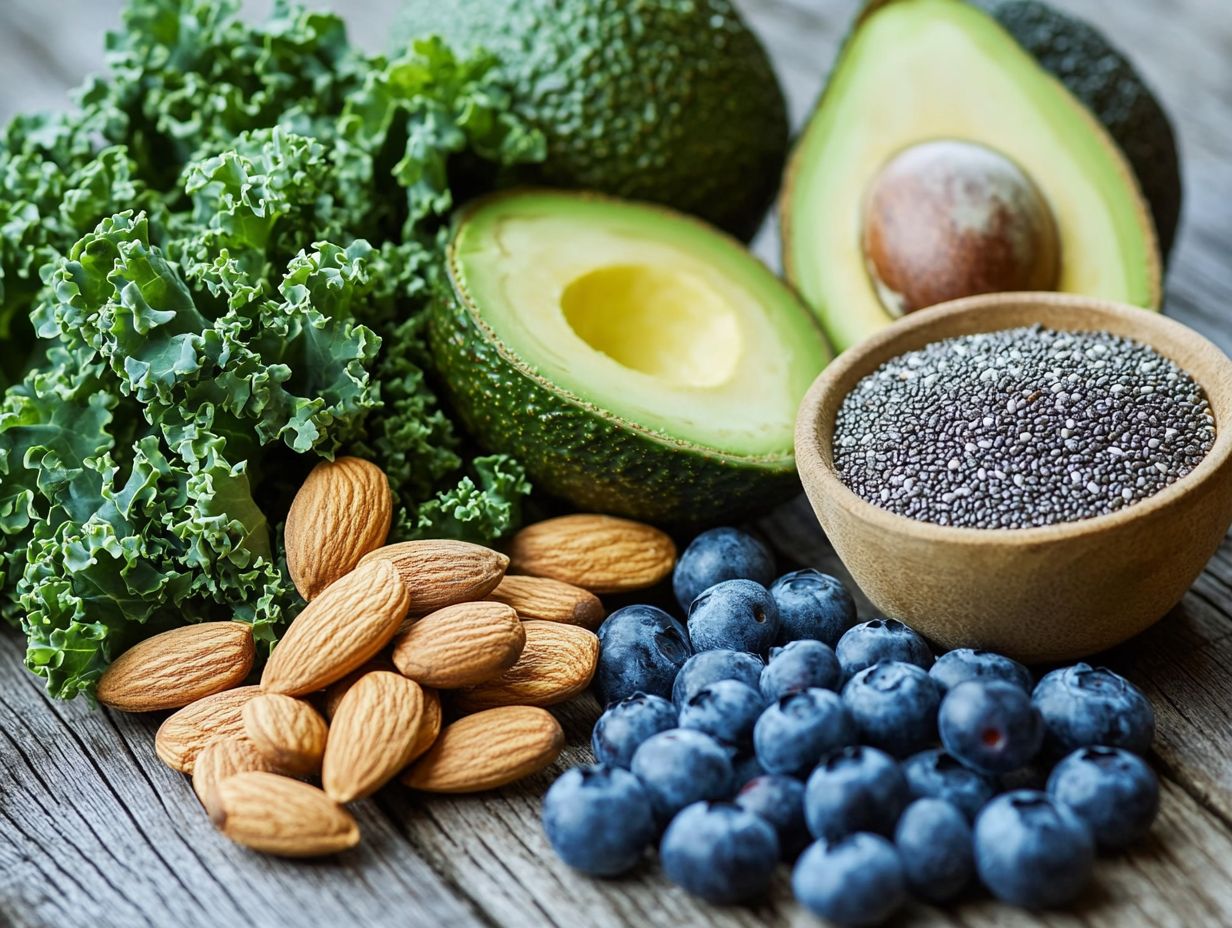
What Makes a Food a Superfood?
A food is considered a superfood when it is packed with high levels of essential vitamins, minerals, antioxidants, and other nutrients that provide multiple health benefits.
What are some common examples of superfoods?
Common superfoods include berries, leafy greens, nuts and seeds, fatty fish, and whole grains. Other examples are avocado, turmeric, and green tea.
Why are superfoods considered beneficial for our health?
Superfoods are beneficial because they provide a wide range of nutrients that support our body’s natural functions, boost our immune system, and help prevent diseases.
Can superfoods help with weight loss?
While superfoods alone cannot cause weight loss, adding them to a balanced and healthy diet can support weight loss efforts by providing essential nutrients and promoting satiety.
Are there any potential risks associated with consuming superfoods?
Superfoods are generally safe and packed with benefits! However, some may interact with certain medications or may not be suitable for people with specific health conditions. It’s always best to consult with a healthcare professional before adding new foods to your diet.
Do all superfoods have to be expensive or hard to find?
No, not all superfoods have to be expensive or hard to find. Many common and affordable foods such as broccoli, carrots, and apples are also considered superfoods due to their high nutrient content.

